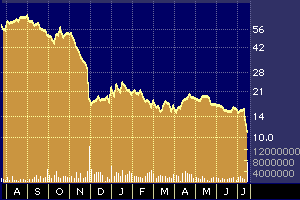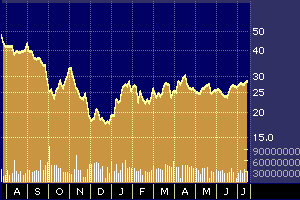
Cashing in on the Coming Server Boom
Cashing in on the Coming Server Boom
by Hal Plotkin
Silicon Valley Correspondent
In Part One of this two-part series, we look at the server market and how you can profit from the sector’s next big wave: the widespread distribution of digital products.
If you know what to look for, you can cash in on the projected boom in sales of computer servers designed for homes and small businesses.
“We’re on the verge of what I call the Internet’s fourth wave,” says Michael Kwatinetz, managing director at Credit Suisse First Boston, based in New York. “It’s going to lead to even stronger demand for servers.”
As Kwatinetz sees it, three previous waves have already swept over the Internet: the advent of online communications; the availability of news and entertainment content; and the rise of e-commerce. All of these things have contributed to strong demand for computer servers, which are the machines that store and serve data either within a company or over the Internet.
The next major wave, Kwatinetz says, will be the widespread distribution of digital products, such as music and video, over the Internet.
“We’re in the early stages of that right now,” he says. “But you can already see what’s going to happen. An average music CD is 500 megabytes. If someone has 200 albums, that’s 100 gigabytes, or about 10 times what the latest PCs can handle. We’re going to need a lot of new machines to store all that data.”
Dataquest vice president Kimball Brown agrees, saying the computer industry is rapidly moving past the idea of a PC in every home and small business and toward the concept of a computer server in every home and small business.
Brown, for one, already has a server in his home. “It makes a lot of sense to me,” he says. “There’s no question in my mind there’s going to be a need for more on-premises equipment.”
Brown says he doesn’t think consumers will want to store many of their largest files on servers owned by Internet service providers, or other companies.
“There are issues with speed, caching, and quality,” he says. For those reasons, Brown says, consumers and businesses will almost certainly purchase ever-increasing numbers of servers to assure more immediate access to their data.
That’s music to the ears of server makers. Four companies, Compaq Computer Corp. {CPQ}, IBM {IBM}, Hewlett-Packard Co. {HWP}, and Dell Computer Corp. {DELL}, currently dominate the market for general-purpose computer servers, according to Dataquest.
| Company | Q1/98 Market Share | Q1/99 Market Share |
| Compaq | 25.9% | 29.5% |
| IBM | 12.9% | 16.5% |
| Hewlett-Packard | 12.9% | 12.6% |
| Dell | 7.3% | 9.0% |
| Others | 41.0% | 32.3% |
| Source: Dataquest | ||
The annual market for general-purpose computer servers is projected to exceed $52 billion by 2002, up from $45.3 billion last year, according to Dataquest.
That, however, is only the beginning. Just 5,000 servers will be sold to home users this year. But by 2003, Brown says, sales of servers for the home will experience a very dramatic upswing. “That’s when it will really start kicking in,” he adds.
Brown says investors should keep an eye on server market-share revenue figures. “The companies that are growing revenues are going to be the big winners,” he adds.
Brown is particularly optimistic about Dell and Gateway Inc. {GTW}, companies that specialize in the direct marketing of computers, despite the fact that neither firm is currently leading in server sales.
“Gateway’s got an interesting way of selling these things,” Brown says. “You can expect them to play [in the home-server market]. No question about it.”
Gateway Inc. {GTW}
 |
 |
Detailed Quote |
 |
Financial Statement | |
 |
Recent Events | |
 |
Company Snapshot | |
 |
Quarterly Earnings | |
 |
Key Statistics | |
| GTW one-year stock price chart | How Taiwan’s Quake May Affect U.S. Firms | |
Likewise, Brown says, Dell is well-positioned to become one of the strongest vendors of high-end network attached storage devices, another segment of the server market. “Dell can sell high-end stuff really cheap. That’s going to help them build market share,” he adds.
Dell Computer {DELL}
 |
 |
Detailed Quote | |
 |
Financial Statement | ||
 |
Recent Events | ||
 |
Company Snapshot | ||
 |
Quarterly Earnings | ||
 |
Key Statistics | ||
| DELL one-year stock price chart | CNBC’s Renay San Miguel reports on the Dell/IBM $6 billion deal | ||
In fact, some analysts say prices charged to end-users for computer servers, particularly those sold to small businesses, will probably drop even more rapidly than personal computer prices have fallen. Manufacturers, of course, will still make money selling servers. But many of the largest server buyers will, in all likelihood, choose to give away the boxes to end-users.
That’s because cheap servers are expected to help create an entirely new class of online-business services, everything from accounting to inventory control. Businesses using those services will get the boxes free or at a nominal cost in exchange for paying an annual subscription fee.
“Free PC schemes eke along because Internet-access fees barely subsidize the cost of the box,” Matthew M. Nordan, an analyst at Forrester Research, based in Cambridge, Massachusetts, wrote in a recent research report. “But server vendors that bundle appliances with high-speed Internet access, e-mail services, and remotely hosted applications to completely automate a small business will re-energize the concept.”


